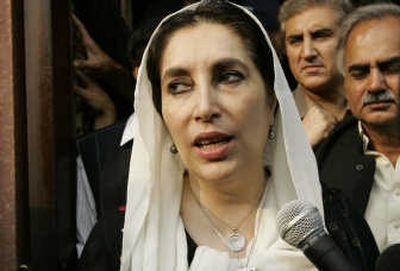Bhutto back under house arrest

LAHORE, Pakistan – Backed by hundreds of police, the government placed former Prime Minister Benazir Bhutto under house arrest today to prevent a protest against President Pervez Musharraf, escalating a war of nerves before a deadline later this week for Musharraf to step down as army chief.
It was the second time in less than a week that the president’s biggest rival has been confined to her home. But she vowed to press ahead with a car caravan from this eastern city to Islamabad, the capital, to increase the pressure on Musharraf to rescind the emergency rule he imposed Nov. 3.
Authorities said they would ban the rally because of the danger of suicide bombers. Early today, police swarmed around the house where Bhutto was staying and tried to serve her with a seven-day detention order, but her aides refused to accept it. Steel and barbed wire barricades were set up, and sharpshooters took up positions on adjacent rooftops.
The latest move appeared to be another example of Musharraf cracking down to prevent protests from gaining steam then easing up to blunt foreign criticism. Police put Bhutto under house arrest Friday, sealed off the demonstration venue and detained her supporters to halt a rally outside Islamabad.
On Sunday, Musharraf said he would hold parliamentary elections in early January. But opposition parties threatened to boycott the polls. Bhutto, the president’s biggest rival, said elections under de facto martial law would be a sham.
While critical of Musharraf, Bhutto has not ruled out cooperating with him. The two have been in talks on a power-sharing agreement, which the U.S. is known to favor in hopes of bolstering moderates in a country that is central to its counterterrorism strategy.
But she reiterated Monday that she had decided to suspend those negotiations, at least while the state of emergency prevails.
The Pakistani leader has come under intense domestic and international pressure to end emergency rule; on Monday, U.N. General-Secretary Ban Ki-moon urged him to do so and to release those who have been arrested.
The White House said Monday that Musharraf should lift the emergency decree before holding elections.
“The president thinks that we need to lift the emergency rule in order to have free and fair elections,” said White House spokeswoman Dana Perino, who added that Musharraf also must quit his army post and restore the country’s constitution.
The Pakistani leader has refused to commit to any timetable for lifting the state of emergency.